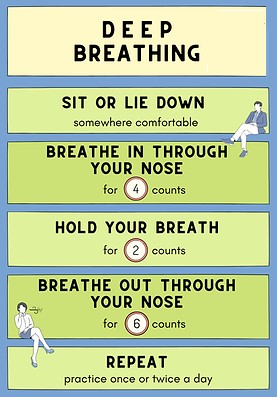
1. Have An Attitude Of Gratitude
When you wake up, instill a positive mindset from the get-go. Don’t move suddenly or leap out of bed. Instead, remain lying down in bed and think about three things you are extremely grateful for, then smile. When ready, ease out of bed slowly. Sit on the side of the bed, stretch your arms out to the sides, then above your head. Stretch your legs out in full and wriggle your toes. Stretching first thing in the morning helps relieve stiffness, increases flexibility and reduces muscle tension.
Then, before standing, do a deep breathing exercise to open up your airways and increase the amount of oxygen flowing into your blood. See graph illustration below on how to do this exercise. There are a number of different types of breathing exercises available online that can be done. The standard rule for breathing exercises, is to do them 5 – 10 minutes each day.
Oxygen is essential to life. Our body must receive appropriate oxygen in order for our cells and mitochondria (the energy house of cells) to function properly. The relationship between oxygen, cells and mitochondria fulfill a host of processes within our body, including the critical functions of our respiratory system, through to digestion and brain function.
This wake-up routine also alleviates risks associated with falls (so many of which occur within minutes of someone getting out of bed).

2. Get Up Earlier To Incorporate Morning Exercise
Get up early to exercise or do some form of physical activity first thing in the morning. It’s a great way to start the day and lose some extra pounds. Ensure you have that large drink of water (with a squeeze of lemon) and your Stem Cell Worx spray before you start. You may decide to go to the gym, go for a walk or hike (with or without the dog), do a yoga class or online exercise class, head to the pool, play pickleball or have a round of golf. You will be amazed at how this makes you feel and it automatically programs you to be more organized and proactive to tackle the rest of the day.
3. Have A High Protein Breakfast
After your morning exercise have a high protein breakfast. Don’t eat breakfast before you exercise. Breakfast can be a very light snack (like a white egg bite or cottage cheese). A general rule of thumb is to consume 1 gram of protein per pound of body weight. Ensure your breakfast doesn’t feel heavy on the stomach or spike your insulin levels (like sugary grain cereals do). A morning shake (that contains high quality protein not soy) is also a great choice with blueberries or another type of low glycemic fruit.
4. Stay Well Away From Over Processed, Sugary Foods and Beverages
Over the last decade, my entire eating habits have changed for the better. I read all the labels. I check expiration dates on food items. I like to take the packages that are stacked at the back of shelves to ensure I get the freshest ones, and I stick to what I know. I don’t go for all the new shiny packages or products and especially if they don’t have research behind them. I have not been sick in over three decades and I am on no medication. I take my daily supplements and that is it.
Six months ago, we alerted our readers to recalls being on the increase and since then the number of recalls on our everyday foods and beverages has tripled. Many recalls are due to manufacturers using poor quality, cheaper substitutes or manufacturing processes to save costs. Often more artificial fillers and cheaper additives like sugar and syrups are added. These culprits are very easily disguised.
Look at the issue for McDonald’s this past month with the recent E. coli outbreak being linked to the fresh, slivered onions on their quarter pounder hamburgers. This is something no one would have known about and its terrible it resulted in one death with many more people being hospitalized.
What can we do? If any serious complications come on quickly (such as stomach cramps, vomiting, sudden temperature changes, changes in bowel movements) as was the case for those affected by this recent E. coli outbreak, get to ER immediately as it’s vital you receive IV fluids and medical care within hours.
When consumable goods are heavily discounted, there is a reason. Check that expiry date, check those ingredients, especially those in small print. Check the supplier’s name along with the manufacturing/packaging source (that may be different countries). Check for verified reviews when looking on the internet. If you spot any red flags do not buy.
5. Deal With Those Aches and Pains, and Minor Health Issues While They Are Still Small
A recent study (released in Nature Aging – August 2024) identified two specific age points when health issues tend to spike in humans. Scientists identified these aging bursts at age 44, and then at age 60.
The scientific study tracked molecules in the blood, poo, and skin, mouth and nose swabs of 108 volunteers aged 25 to 75 every few months for between one and nearly seven years.
The first wave of changes in the 40s included molecules linked to cardiovascular disease and the ability to metabolize caffeine, alcohol and lipids. The second wave of changes at age 60 included molecules involved with immune regulation, carbohydrate metabolism and kidney function. Molecules linked to skin and muscle aging changed at both time points.
“We’re not just changing gradually over time. There are some really dramatic changes,” said Prof Michael Snyder, a geneticist and director of the Center for Genomics and Personalized Medicine at Stanford University and senior author of the study.
These findings will help us target interventions, such as increasing exercise during periods of more rapid muscle loss, the authors said. “I’m a big believer that we should try to adjust our lifestyles while we’re still healthy,” Snyder said.
The following lifestyle changes can help reduce and manage health aging spikes:
If you are experiencing a small health issue, make it your priority to get it resolved quickly. This could be muscle soreness, stiffness, joint and nerve pain, a change in bowel movements, bloating, or a wound, infection, congestion or an annoying cough that is not going away within a matter of 1-2 weeks. Do not leave it and hope for the best. A quick response (especially when it comes to a small health issue) is always best and saves many lives every year. This may include screening, fluid IVs, a quick visit to the Chiropractor or Doctor (for an MRI, a CT scan and getting your blood work done), reducing alcohol and/or cigarettes, increasing exercise and reducing high calorie/ultra processed foods and beverages.
Check your medications regularly with your primary care Doctor. Often people are on so many medications they are working at cross-purposes or causing unacceptable side effects.
“People are on 5, 10, even 20 medications,” Mary Tinetti, M.D., Chief of Geriatric Medicine at the Yale New Haven Health System and the Yale School of Medicine, said. “And nobody thinks that 20 medications are beneficial.” A least once a year, you should put all of your pill bottles in a bag (including all over-the-counter drugs and supplements) and take them to your primary care doctor for a review.
One major effect of aging is loss of muscle mass. This directly affects core strength, especially the legs (being one of our largest muscle groups). Lack of muscle, physical activity and movement also affects our flexibility and our blood flow throughout the entire body. You must fight to keep your muscle mass no matter what your age. If you don’t do anything to fight it, you could find yourself one day unable to get out of an armchair or struggling to walk more than a few minutes at a time.
Here’s a quick test to find out whether your fitness has deteriorated to a point that puts you at risk:
Time how long it takes you to get out of an armchair, walk 10 feet, walk back, and sit down again.
A healthy adult older than 60 should be able to do it in 10 seconds or less.
Did you pass or fail the test? The good news is, it’s never too late to start working out to counter aging’s effects. “There’s no medication, no medical device that has anywhere near the effectiveness of physical activity,” Tinetti said.
Written By:
Maree Day
Director
Stem Cell Worx
Tags: 2025 motivation, ageing, energy, heal your body, more energy, new year goals, stay postive, stem cell, stem cell supplements, Stem Cell Worx, wellness





